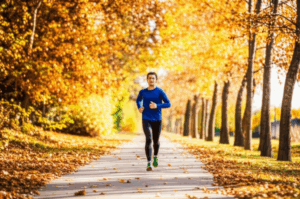We all know exercise is good for our bodies, but its impact on our minds is equally profound. In today’s fast-paced world, stress and mental health challenges are increasingly prevalent. Fortunately, physical activity offers a powerful, natural way to combat these issues, leading to a happier, healthier you.
The Science Behind the Sweat: How Exercise Impacts Your Brain
Exercise isn’t just about building muscle or losing weight; it’s a workout for your brain too. Here’s how movement helps reduce stress and boost your mental well-being:
- Pumping Up Endorphins: Physical activity stimulates the production of endorphins, the brain’s natural feel-good neurotransmitters. These chemicals act as natural painkillers, reduce stress, and improve your mood, often resulting in that “runner’s high”. Even activities like a fun game of tennis or a walk in nature can trigger this happy feeling.
- Reducing Stress Hormones: Exercise helps lower levels of stress hormones like cortisol and adrenaline in the body. This can lead to a sense of calm and relaxation, making it easier to manage daily stressors.
- Boosting Brain-Derived Neurotrophic Factor (BDNF): Exercise increases BDNF levels in the brain, acting like a fertilizer for brain cells. BDNF supports the health of existing brain cells and promotes the growth of new ones (neurogenesis), improving cognitive function, mood, and memory.
- Improving Blood Circulation: Exercise increases blood flow to the brain, influencing the hypothalamic-pituitary-adrenal (HPA) axis, which plays a key role in our physiological response to stress. This improved circulation can enhance cognitive function and reduce anxiety and depression.
- Promoting Neuroplasticity: Exercise enhances neuroplasticity, the brain’s ability to adapt and change over time. This allows neurons to adjust to disturbances, improve stress coping, enhance cognitive control, and improve memory.
The Mental Health Benefits: More Than Just Stress Relief
The benefits of exercise extend far beyond simple stress reduction. Regular physical activity can significantly improve various aspects of your mental health:
- Combating Anxiety: Exercise has been shown to be protective against anxiety disorders and can significantly reduce anxiety symptoms. It helps relieve tension, boost energy, and enhance overall well-being. Even just five minutes of aerobic exercise can have anti-anxiety effects.
- Easing Depression: Exercise is a valuable tool in managing depression, especially mild to moderate cases. It can boost mood, improve self-confidence, and provide a sense of accomplishment. Some studies suggest that exercise can be as effective as antidepressants for some individuals with mild to moderate depression.
- Sharpening Memory and Thinking: The endorphins released during exercise not only make you feel good but also help you concentrate and feel mentally sharp. Exercise stimulates the growth of new brain cells and helps prevent age-related cognitive decline.
- Boosting Self-Esteem: Regular physical activity is an investment in your mind, body, and soul. Achieving fitness goals, no matter how small, can boost your self-confidence and make you feel better about your appearance.
- Improving Sleep: Exercise can improve sleep quality, which is often disrupted by stress, depression, and anxiety. Better sleep, in turn, can ease stress levels and help you manage your body and life more effectively.
- Increasing Resilience: Exercise can help you build resilience to cope with mental and emotional challenges in a healthy way. It provides a positive coping strategy, reducing the likelihood of turning to negative behaviors like alcohol or drugs.
- Reducing ADHD Symptoms: Regular exercise can effectively reduce the symptoms of ADHD and improve concentration, motivation, memory, and mood. Physical activity boosts dopamine, norepinephrine, and serotonin levels in the brain, similar to how ADHD medications work.
- Alleviating PTSD Symptoms: Focusing on your body and how it feels during exercise can help your nervous system become “unstuck” from the immobilization stress response associated with PTSD or trauma. Activities involving cross movement, like walking, running, swimming, or dancing, are particularly beneficial.
Finding Your Movement: Types of Exercise for Mental Well-being
The best type of exercise for mental health is the one you enjoy and will stick with. Here are some options to consider:
- Aerobic Exercise: Activities like running, cycling, swimming, dancing, and brisk walking are excellent for reducing anxiety and depression. Aim for at least 150 minutes of moderate aerobic activity or 75 minutes of vigorous aerobic activity each week.
- Strength Training: Weightlifting or bodyweight exercises can build physical strength and boost self-esteem. Strength training has been linked to improved body image and increased feelings of empowerment.
- Yoga: This mind-body practice combines physical postures, breath control, and meditation to enhance mental clarity, reduce anxiety, and improve overall well-being.
- Tai Chi: This ancient Chinese martial art involves slow, graceful movements and deep breathing, promoting relaxation and balance.
- Mindful Walking: Walking slowly and mindfully, focusing on your breathing and surroundings, can reduce stress, anxiety, and depression.
- Team Sports: Joining a sports team can provide social interaction and a sense of belonging, boosting your mood and reducing social anxiety.
Social Benefits: Connecting with Others Through Exercise
Exercise can also enhance your social life, providing opportunities to connect with others and build supportive relationships:
- Meeting New People: Exercise classes, sports teams, and even walking groups can be great ways to meet people who share your interests.
- Improving Communication Skills: Exercising in a group setting can improve your communication skills, as you learn to convey instructions and listen to feedback effectively.
- Boosting Your Mood: Exercise releases endorphins, making you more likely to engage positively with others. This can lead to more meaningful conversations and stronger connections.
- Building Teamwork Skills: Team sports naturally build teamwork skills in a low-pressure, relaxed environment.
- Reducing Social Anxiety: Exercise can reduce social anxiety by releasing feel-good chemicals, making you more open to others.
- Increasing Energy for Socializing: Regular exercise can improve your sleep quality and increase your energy levels, making you more inclined to socialize.
- Finding Your Tribe: Working out regularly can help you find like-minded people who are committed to a healthy lifestyle.
Getting Started: Making Exercise a Habit
Incorporating exercise into your routine doesn’t have to be daunting. Here are some tips to get started and stay motivated:
- Talk to Your Healthcare Professional: If you haven’t exercised in a while or have health concerns, consult your healthcare professional before starting a new exercise plan.
- Start Slowly: Begin with small amounts of exercise and gradually increase the intensity and duration as you feel more comfortable.
- Choose Activities You Enjoy: The most important thing is to pick activities that you find fun and engaging.
- Set Realistic Goals: Set specific, measurable, achievable, realistic, and timely goals to stay motivated.
- Make It Social: Exercise with friends or join a group to make it more enjoyable and increase accountability.
- Put It in Your Calendar: Schedule exercise into your day like any other important appointment.
- Reward Yourself: Celebrate your progress and reward yourself for reaching milestones.
- Be Patient: It may take a few weeks to feel the full effects of exercise on your mental health. Stick with it long-term to continue to benefit.
A Holistic Approach: Combining Exercise with Other Therapies
While exercise offers significant mental health benefits, it’s important to remember that it’s not a replacement for professional help. If you’re struggling with a mental health condition, consider combining exercise with talk therapy, medication, or other treatments recommended by a healthcare professional.
Final Thoughts
Exercise is a powerful tool for improving your mental health and reducing stress. By understanding the science behind the sweat and finding activities you enjoy, you can harness the transformative benefits of movement for a happier, healthier, and more resilient you.







